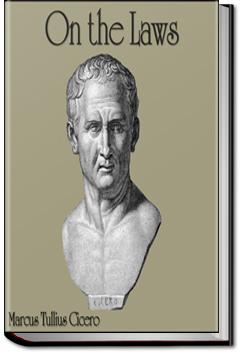UNLIMITED Audiobooks and eBooks
Over 40,000 books & works on all major devices
Get ALL YOU CAN for FREE for 30 days!
On the Laws
Marcus Tullius Cicero
Book Overview:
On the Laws (Latin: De Legibus) was written shortly after Cicero's "On the Commonwealth" during the last years of the Roman Republic. The three surviving books (out of an original six), in order, expound on Cicero's beliefs in Natural Law, recast the religious laws of Rome (in reality a rollback to the religious laws under the king Numa Pompilius) and finally talk of his proposed reforms to the Roman Constitution.
On the Laws (Latin: De Legibus) was written shortly after Cicero's "On the Commonwealth" during the last years of the Roman Republic. The three surviving books (out of an original six), in order, expound on Cicero's beliefs in Natural Law, recast the religious laws of Rome (in reality a rollback to the religious laws under the king Numa Pompilius) and finally talk of his proposed reforms to the Roman Constitution.
How does All You Can Books work?
All You Can Books gives you UNLIMITED access to over 40,000 Audiobooks, eBooks, and Foreign Language courses. Download as many audiobooks, ebooks, language audio courses, and language e-workbooks as you want during the FREE trial and it's all yours to keep even if you cancel during the FREE trial. The service works on any major device including computers, smartphones, music players, e-readers, and tablets. You can try the service for FREE for 30 days then it's just $19.99 per month after that. So for the price everyone else charges for just 1 book, we offer you UNLIMITED audio books, e-books and language courses to download and enjoy as you please. No restrictions.
Try now for FREE!

"Love your service - thanks so much for what you do!"
- Customer Cathryn Mazer
"I did not realize that you would have so many audio books I would enjoy"
- Customer Sharon Morrison
"For all my fellow Audio Book & E-Book regulars:
This is about as close to nirvana as I have found!"
- Twitter post from @bobbyekat



Community Reviews
An almost ideal blend of Plato and Aristotle and a wonderfully relevant read regarding statesmanship, public morality, and tradition. The gaps in the text are certainly frustrating and Cicero isn't nearly as artful an author as he thinks he is, but there are still plenty of unique insights here that
“Many years later, the emperor Augustus (who had acquiesced in Cicero’s murder) found one of his grandsons with a work of Cicero’s in his hand. The youngster tried to hide the book under his cloak, but Augustus took it from him and read through a large part of it where he stood. Then, handing it bac
It is terribly difficult to judge fragments, and especially to compare them with complete works such as Plato's Republic. That being said, Cicero clearly takes a much different approach than does Plato. He proposes that philosophy must be intermixed with pragmatism and experience to produce the opti
Cicero’s Republic
11 May 2020
This is sort of a lost book. Not quite but it certainly isn’t complete, namely because it was only recently discovered, namely in the 19th Century when somebody was having a look for something else while they were down in the Vatican library. In fact, since it was discov
Its difficult to give the two works a fair appraisal, as they survive only with large sections missing. Perhaps the most interesting section of the Republic was his discussion of the Roman constitution and how it developed historically. Cicero's philosophy is pretty derivative, taking heavily from P
In high school I read Cicero in third year Latin. My teacher, like most classics teachers, found him indispensable. The proposition he put was twofold:Cicero was a master of Latin prose (very difficult to translate because of his long, complex sentences) and Cicero was a defender of a republic that